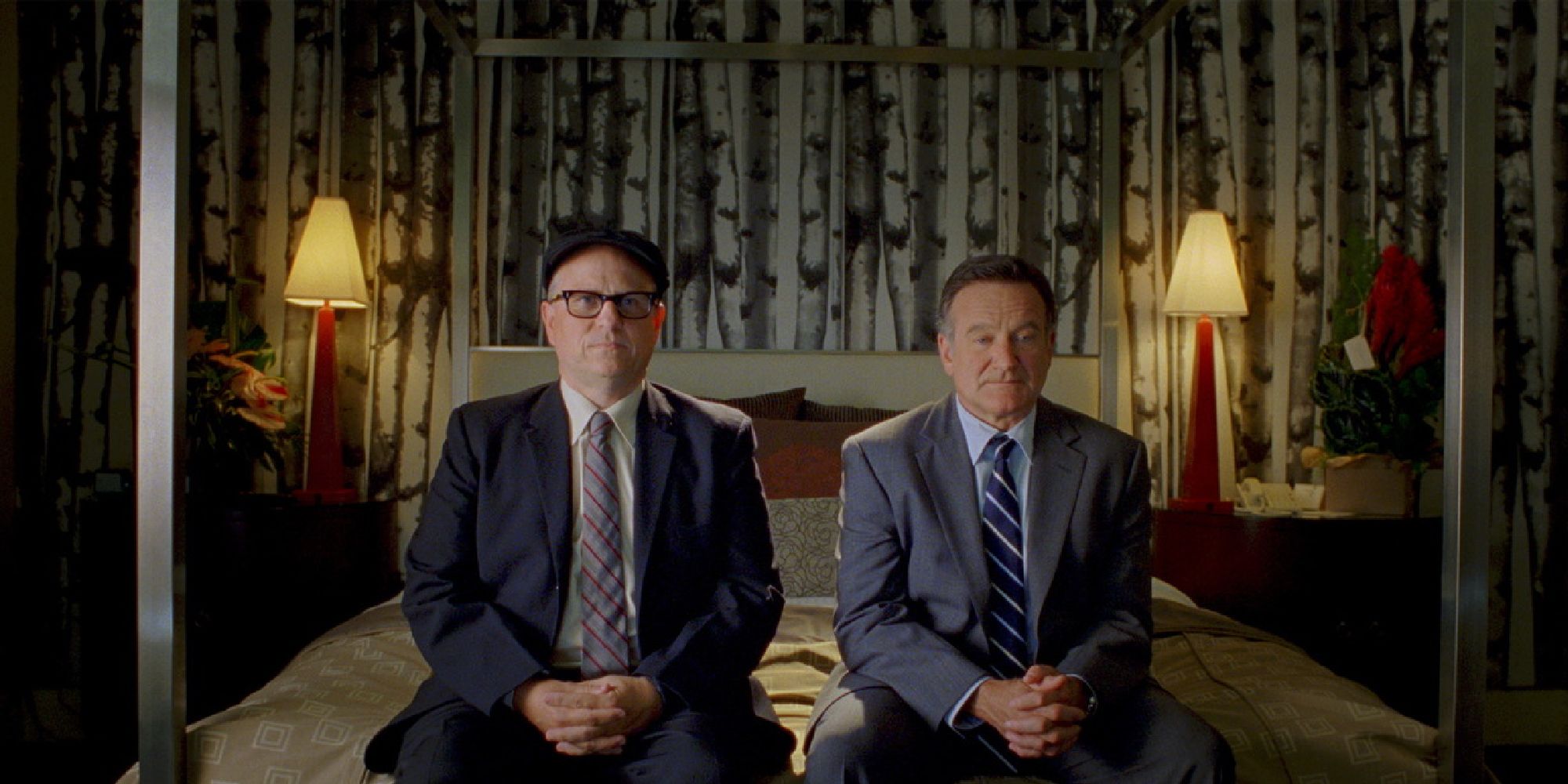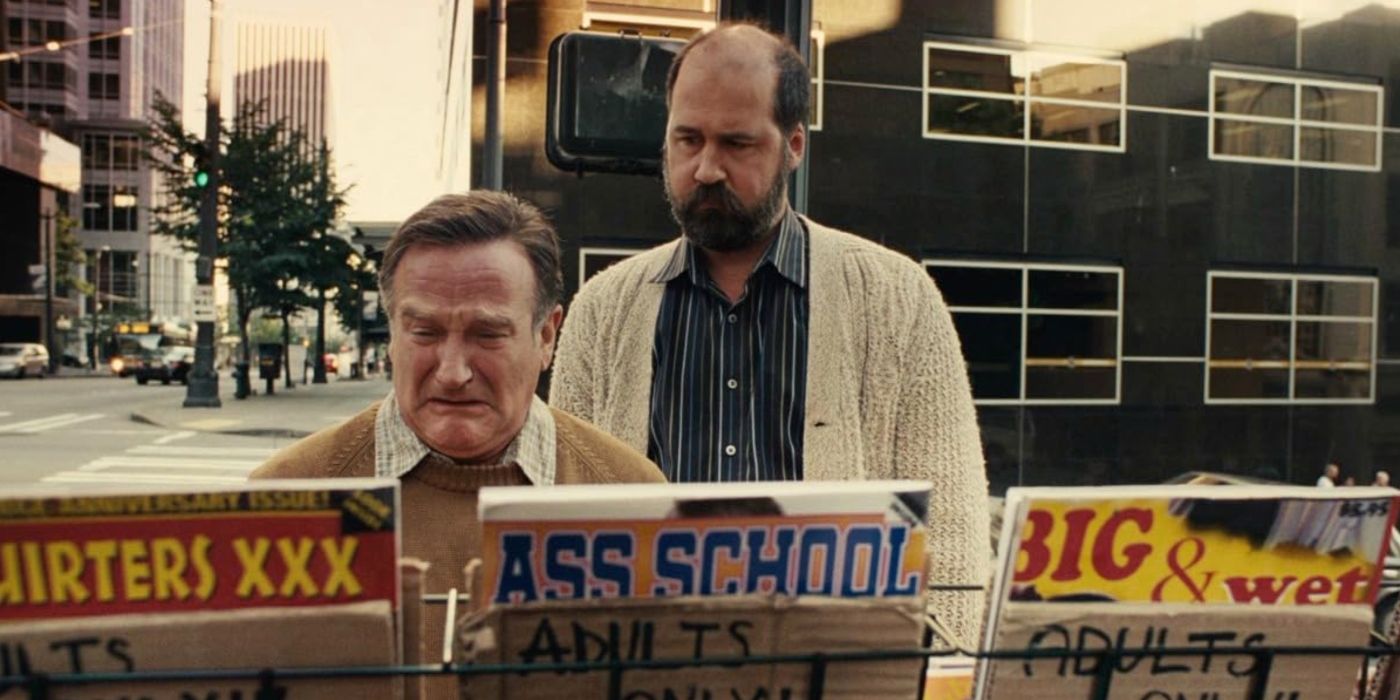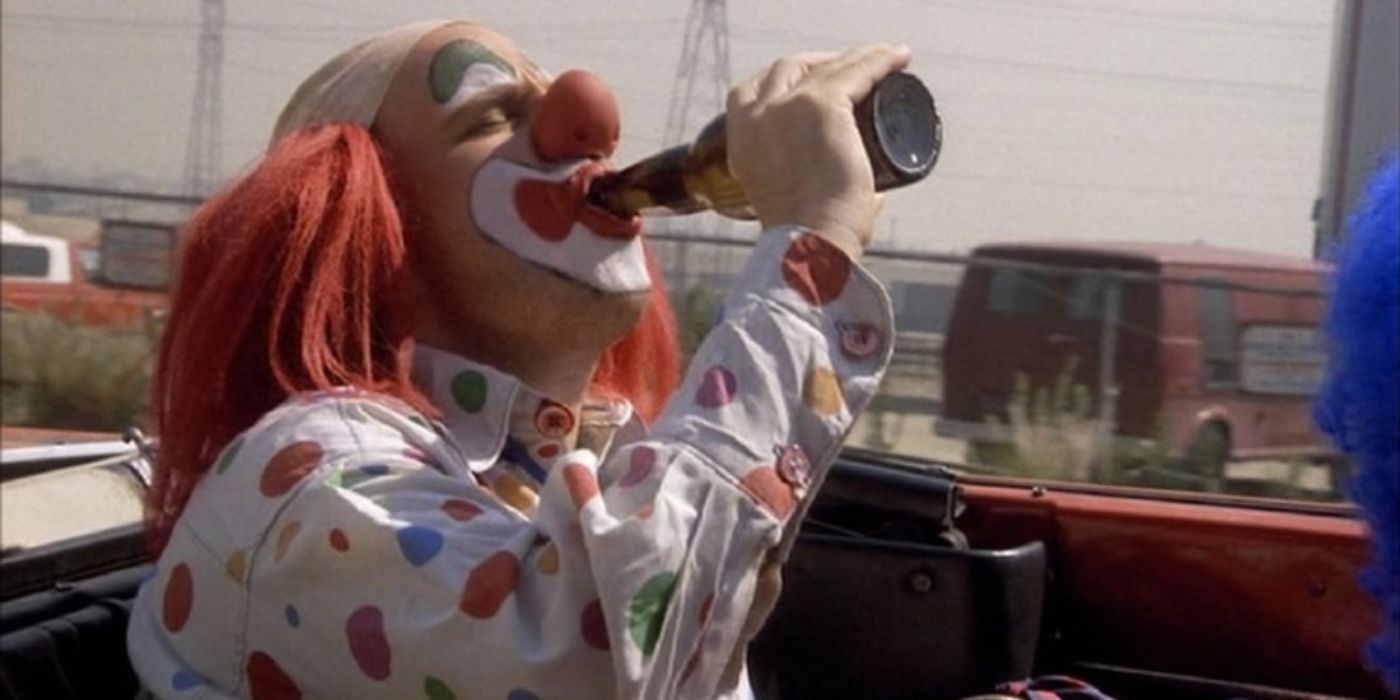Robin Williams is remembered as one of the most versatile and beloved performers of all time, and even now, ten years after his passing, he’s still cared about as much as ever. From his beginnings in stand-up comedy to portraying a fish-out-of-water alien on TV’s Mork & Mindy, it was clear from the get-go that he was unlike any of his contemporaries. Williams seemed to be truly from beyond the stars, and his larger-than-life roles befit his otherworldliness, from the Genie in Aladdin to Popeye the Sailor Man to Jack, the perpetual child. He seemed on-screen to always be chasing humanity, so it’s strange to posit his most powerful and honest performance comes in his most disturbing film, 2009’s World’s Greatest Dad. Written and directed by fellow comedian Bobcat Goldthwait, the film is a crude and hard-hearted minefield of triggers and sordid toilet humor, anchored by a cringe-inducing and yet wholly genuine performance from Williams. It is likely his most human turn, after a lifetime of striving for such authenticity.
Robin Williams Excelled at Playing Lovable Father Figures
Williams rose to fame playing likable, zany characters. Mork was an early standout, and though the majority of the 1980s found him clamoring for dramatic acclaim, he leaned into his comic stylings in the 1990s, cranking out iconic turns in films like Aladdin, Nine Months, Jumanji, The Birdcage, Hook, and Mrs. Doubtfire. Those last three specifically showcased Williams as a devoted father, willing to go to great lengths to do right by his children. Armand Goldman performs an elaborate misdirection to grant his son the blessing of marriage, Peter Banning returns to Neverland to rescue his children, and Daniel Hillard performs an elaborate scheme to spend time with his kids during a separation from their mother.
Mrs. Doubtfire in particular is a very emotional film, even if it’s a comedy about Williams dressed up as an old woman putting on a funny voice. Not only is it tragic, with a man missing his kids so much that he’ll pretend to be someone else just to see them, but it also has a meaningful behind-the-scenes story. Directed by Chris Columbus, Mrs. Doubtfire was originally going to have Daniel and Miranda (Sally Field) get back together at the end, but that didn’t work for Williams. That might have been a happy ending, but it wasn’t a realistic one. Even in his more lighthearted movies, Williams wanted to be raw and real. He had gone through his own divorce and young kids and worried that kids of divorce would watch Mrs. Doubtfire and then get hopeful that their own parents will get back together. To disappoint kids in that way was too much, so Williams insisted that Daniel and Miranda become friends and successful co-parents at the end, but they couldn’t be romantically involved again.
It seemed at every turn that Williams was positioning himself to be America’s Funny Dad, even going so far as to square off against Billy Crystal in 1997’s Fathers’ Day for that distinction. Perhaps even more telling was his turn in the 1999 science fiction philosophy tale Bicentennial Man. In the film, Williams plays a robotic helper (essentially an android appliance) that learns to yearn to be human. He lobbies, first with his family, and eventually and repeatedly with the governing body of his nation, to become increasingly more human, adopting rights, a more befitting corporeal form, and later to be allowed to die. It seemed to be a role wherein Robin Williams, the performer, was begging audiences to be seen as Robin Williams, the man.
Robin Williams Played Villains in Movies Like ‘Insomnia’ and ‘One Hour Photo’
When those aforementioned roles failed to have the desired effect of dramatic acclaim, Robin Williams broke bad, leaning into truly villainous roles. In 2002 alone, he turned in three groundbreaking performances, as murderer Walter Finch in Christopher Nolan’s Insomnia, stalker Sy Parrish in One Hour Photo, and sociopath Rainbow Randolph in Danny DeVito’s dark comedy Death to Smoochy.
In Insomnia, Williams is a serial killer being chased down by Al Pacino‘s Will Dormer, and in Death to Smoochy, he is a fired children’s TV host who will do whatever it takes to take down his replacement (Edward Norton), but of the three, One Hour Photo is Williams’ best because, yet again, he’s playing a family man. However, what should be comforting is instead chilling and very uncomfortable because Sy Parrish doesn’t have a family of his own. Sy is a quiet and very lonely man working at a one-hour photo shop. His loneliness and desire to have his own family leads to him becoming obsessed with the families behind the photos he sees every day. It would be heartbreaking if Sy Parrish wasn’t stalking one family in particular, trying to ingrain himself into their lives, even if it’s against their will.
Each of these films saw Williams shed his paternal image and embody characters that were categorically unlikable, though it is the Rainbow Randolph character that most closely telegraphs what he would eventually bring to World’s Greatest Dad. There’s a simplicity to Randolph’s reactionary reshaping of the events that surround him and box him in. Though audiences wouldn’t necessarily see themselves in his actions, they can at least, as the rules of black comedy command, follow his downward spiral with diminishing doses of sympathy.
What Is ‘World’s Greatest Dad’ About?
World’s Greatest Dad stars Williams as sad sack Lance Clayton, a failed writer raising a despicable child in a quaint corner of America. Coming in at a lean 99 minutes, the first 40 find us learning the definitions of Clayton’s boxed life. He hasn’t published any of the many writing endeavors he’s queried over the years and is, in fact, on the verge of giving it all up if his fifth novel is rejected. He is a single father teaching poetry in a sparsely attended class in a nondescript preparatory high school. He has a secret romance with the art teacher, played with frequent turns of sincerity and sensationalism by Alexie Gilmore, though he is nonplussed by her reticence to make their connection known. He is a withdrawn man, embittered by his perceived failures and jealous of his charming and handsome colleague Mike Lane, played by Henry Simmons. When he discovers that Mike has published a short in The New Yorker, he attempts to undercut the success with derisive remarks, all of which miss their mark and further paint him as shallow and ineffective.
Most damning of all, however, is the dark cloud of Lance’s foul-mouthed, perverted, insensitive, and all-around contemptible son, Kyle. Director Goldthwait seems to take great pleasure in ruining childhoods, not only tarnishing our remembrances of Aladdin by casting Williams but also ruining Spy Kids, as well, by casting Daryl Sabara as the reviled son. Kyle is thoroughly unlikable, defining himself by his fascination with extreme porn, lambasting all of his schoolmates as phonies, and referring to all around him with the most offensive slurs he can get away with. The character is given virtually zero redeeming qualities, so few are moved when he unceremoniously passes away during an autoerotic asphyxiation session gone awry. The only ones to mourn him are his father, Lance, and his only friend, Andrew, played by Evan Martin.
Williams Gives a Twisted Performance as a Grieving Father in ‘World’s Greatest Dad’
From the point of Kyle’s death onward, both the film and Williams come alive. The scene wherein Lance finds Kyle’s body is heartbreaking, and in a move of filmmaking genius, it is done without dialogue. Music swells as all other sound falls away, and the viewer is given only the images of Lance’s pained howls as he cradles his son’s body in his arms. It is a gutting, raw performance from Williams, and one that gives the audience its last perception of him as relatable for a good long while. Realizing the legacy of the circumstances of his son’s demise, Lance makes a decision to rewrite his passing. He stages his son’s strangled body in the door of his closet to look like a suicide, and pens a devastating suicide note accusing the student body of ostracizing Kyle and leading him to take his own life. This symbolic act turns out to damn the father to a similar fate.
As the contents of “Kyle’s” letter are released, a cult of personality surrounds the lost child. Lance is caught up in the frenzy of strangers reinventing themselves as comrades to his son, and the accompanying media circus that sensationalizes teen angst. Lance goes on to pen a diary from Kyle’s point of view, and it becomes a runaway success. Soon, he has invitations to golf with his superiors, an invitation to be on television, and the undivided attention of his love interest. His life is starting to look like he’d always imagined it, with bags of cash and the adoration of strangers. The lies weigh on him, however, reshaping him into someone he doesn’t recognize, the same way he had reshaped his son into a misunderstood prophet of ignominy.
Robin Williams’ Character in ‘World’s Greatest Dad’ Is All Too Human
To distill the humanity of Williams’ performance in World’s Greatest Dad, one needs to look at one unlikely scene. The overall theme of the film is the revisionist gloss we use to paint over the legacy of those we lost, and the corners we paint ourselves into with the little lies that bring us comfort in our darkest times. There is a moment in World’s Greatest Dad that finds Lance standing before a street vendor’s magazine rack, looking upon a selection of filthy pornographic magazines. He isn’t reaching out to them, and he isn’t interested in their stark depictions of sexuality and base hedonism. He probably doesn’t even see the women exploited on their covers. He sees his son — his filthy, perverted son — and he openly weeps. He is comforted by the vendor, played by Nirvana bassist Krist Novoselic, with a simple arm around the shoulder. It is a reflective act and a distillation of humanity.
The vendor likely doesn’t know why the man is crying, and Lance knows that, but he accepts the comfort all the same. It’s a reminder that we’re all microcosms unto ourselves of bottomless depths, and we are ultimately unable to understand or categorize those around us. Everyone is a boundless mystery and that is what truly binds us: our differences. Robin Williams’ performance, not just in this scene but in the entirety of World’s Greatest Dad, though explored through the lens of pitch-black comedy, manages to nail these themes of loss and connection to a disturbing, but wholly effective tee.
‘World’s Greatest Dad’ Wasn’t the First Time Robin Williams and Bobcat Goldthwait Worked Together
Almost two decades before making World’s Greatest Dad, Bobcat Goldthwait wrote and directed the oddball 1991 black comedy Shakes the Clown. Goldthwait himself played the titular role as an alcoholic clown who does birthday parties. That might sound like too much, but if you know Goldthwait’s bizarre style of comedy, then the material suits him well. Three years later, when Goldthwait set fire to a chair during a taping of The Tonight Show with Jay Leno, it was shocking, yet at the same time not, because if anyone was going to commit arson on a late night talk show, it was Bobcat Goldthwait.
Goldthwait pushes his comedy to the edge, as if very clear with World’s Greatest Dad. The same can be said of Shakes the Clown, where our hero is on the run after being framed for murder. Goldthwait was one of the ’90s biggest oddballs, but he was a liked one. He had to be, or Shakes the Clown wouldn’t have co-starred the likes of Julie Brown, Jack Gallagher, Florence Henderson, Adam Sandler, and one Robin Williams, who was at the height of his career. Williams’ role is small, as that of a mime named Jerry, but the weirdness is pure Robin Williams zaniness.
In 2019, Bobcat spoke to Vulture where he reminisced about his close friend and how he met him. The pair met when they were 19, but it was a few years later, when Goldthwait moved to San Francisco, that they became good friends, then very close friends. Although they had worked briefly together on Shakes the Clown, Goldthwait admitted that he was nervous about directing Robin Williams in World’s Greatest Dad because of his legacy in Hollywood. Bobcat said:
“Making
World’s Greatest Dad
was funny, because the night before I was going,
How’s this going to go? Am I going to tell him to do something, and he’s going to say, “You were in
Police Academy
and I have an Academy Award”?
But it was nothing like that. We started and it was a collaboration.”
When Robin Williams died in 2014, we lost an actor that we loved. For Bobcat Goldthwait, he lost one of his best friends. A decade later, we continue to mourn Robin, but we celebrate him too, whether it be the wholesomeness of a movie like Aladdin, or the most awkward and strangest of comedies, like World’s Greatest Dad. Robin Williams could do it all.
World’s Greatest Dad is available to watch on Max in the U.S.
Watch on Max






